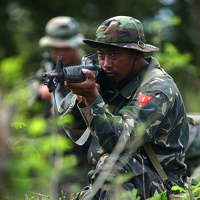Despite numerous statements by Philippine and U.S. authorities over the past few years highlighting progress in the fight against terrorism, recent events in the southernmost corner of the Philippines show that the battle there is far from won.
On Aug. 1, seven Philippine marines were killed -- five of them beheaded or mutilated -- and 21 others wounded after being ambushed by some 300 alleged members of the Abu Sayyaf Group (ASG) in Patikul, in the Sulu Archipelago. Unconfirmed reports say that 11 ASG members were also killed in the fighting.
The ASG, often labeled a local terrorist group, has been the target of a U.S.-backed Philippine military offensive since 2002. Noncombat U.S. special forces arrived in the Sulu Archipelago in the aftermath of the 2001 Afghanistan invasion as part of the global war on terror. Manila rolled out the red carpet, in large part due to Washington's promise to fund the Armed Forces of the Philippines (AFP), which is tasked to do the fighting on the ground. Roughly 400 U.S. soldiers are currently deployed in the region as part of the Joint Special Operations Task Force-Philippines (JSOTF-P). Their role is mostly in capacity building, technical advice and training, civil-military operations and intelligence support.

